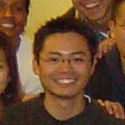Berkeleyan
Pulling all-nighters, buying pizza, dressing up as Darwin . . .
It's all in a day's teaching for the campus's GSI "heroes" - the second of three groups commended for their commitment to Berkeley's undergrads by the students themselves in a recent survey
![]()
| 08 December 2005
| GSI Heroes Full list of those cited by students |
Editor's note: Undergraduates who completed the 2005 UC Undergraduate Experience Survey conducted by the campus Office of Student Research were asked to name someone - staffer, administrator, or teacher - who had gone "above and beyond" the call of duty during their undergraduate experience. Several thousand of them did so, and the resulting long list of names constitutes a roster of "everyday heroes" on the Berkeley campus - a cohort that the Berkeleyan and the online NewsCenter are acknowledging and celebrating into 2006.
The first set of heroes - all of them staff members - was highlighted in our Nov. 10 issue. This week it's the turn of the graduate student instructors (GSIs) whose labors on their behalf won them recognition from hundreds of undergraduates surveyed. In our Jan. 19 issue, we'll complete this heroic trifecta with coverage of the campus's faculty heroes. In the meantime, be sure to visit the NewsCenter regularly to see Everyday Heroes being highlighted every day, complete with a sentence or two from a student who praised her or him.
* * *
 'I made over 500 friends in three semesters, and I can recall more undergraduate names than I could ever imagine. I am proud and very happy to have been able to help our own people, Cal students.' -William Wong,
Haas MBA '05 |
Now working as a senior investment analyst for a money-management firm in New York City, Wong explains in a lengthy, humble e-mail that he considers all students - whether officially his charges or not - his "friends." He was always available to them because he did not have a computer of his own, thus necessitating a lot of time in the campus computer lab. "I was there pretty much the whole time, and if you have a question, why not ask me right away?" he writes, claiming such interruptions were his study breaks.
His philosophy of teaching, which he prefers to call "sharing," is also quite unusual: He told students that he wouldn't take attendance, even if it was required, or penalize them for not attending his discussions.
"Though it seemed like my class was an unrestricted world," says Wong, "it turned out that the audience would in turn behave how they were supposed to - a fully attended class, polite behavior, and lastly, the true and honest respect you get because you have given them the respect that they need."
The night shift
Wong wasn't the only GSI cited for his constant dedication and availability. Several students commended Meghdad "Amin" Hajimorad, an electrical-engineering teaching assistant, who "devoted countless hours in the labs to help students," according to one respondent. "He pulled all-nighters to help students, and sacrificed his own work and sleep to make sure that we understood the material."
 'When I got the letter from the chancellor, I was standing in the mailroom going, "Don't cry, don't cry." I really care about teaching, but just because you care about it doesn't necessarily mean you're good at it, that you've helped someone. This means so much to me.' -Kristina Gehrman, fourth-year philosophy
Ph.D. candidate |
When a student asked Mark Bandstra, a physics teaching assistant, if she could see her final exam from the previous semester, he "went through the trouble of obtaining and e-mailing the final exam questions, the histogram, and the final-exam solutions to me, as well as getting my blue book for me." Since the student couldn't take away the blue book, Bandstra met with her for nearly three hours - on a Friday evening, no less - and painstakingly went through each of the questions and her answers . even though Bandstra was no longer the GSI for the class. And then, because it was dark, he walked her back across campus to her dorm.
Another undergraduate nominated Lianne Beltran, a graduate student in the College of Chemistry who provided copious amounts of counseling, both academic and personal. "Her heart is golden," wrote the student. "If she [saw] me working late in the lab, staying even overnight, she would buy me breakfast."
All-around all-stars
Many of the survey respondents were grateful for specific academic support they received from their GSI heroes. Kristina Gehrman, a philosophy GSI, helped one of her undergraduates immensely by allowing the student to rewrite a paper "because she realized I understood the material but did not know how to write a philosophy paper. She took the time and effort to help me improve my logical-writing skills, which will still be helpful in the future after I graduate....Kristina is one of those GSIs who actually take to heart the burden of having the responsibility to guide and assess the success of students."
 'To me, the most striking thing about teaching is how much you learn. There's something about trying to explain complicated concepts to people that you don't capture when you're just receiving the information. ' -Hal Haggard,
second-year physics Ph.D. candidate |
Other GSIs rivaled Wong in their willingness to help students with tasks that fell outside their job descriptions. Physics grad student Hal Haggard, the GSI for an electronics-lab class, overheard undergraduates bemoaning how difficult it was to prepare for the GRE subject test in physics. "After hearing us mention it, without a second thought Hal offered to run a night workshop for the GRE," wrote the student. "He even offered to help us edit our graduate-school application essays - far above and beyond the content of an electronics-lab class!"
Haggard confirms that he spent one night per week and several weekends helping the students get ready. "The GRE is a miserable experience; it didn't need to be any more miserable than it was," he shrugs.
A little of that human touch
Mostly, it's the small things that count. Many undergraduates seemed amazed that GSIs would give out their home phone numbers and instant-messaging handles, and take the trouble to learn the names of the students in their sections.
 'You can't force people to learn at a particular rate. Some of my students really wanted to understand what they were doing, not just follow the instructions for the lab as fast as they could. If they wanted to stay late on Friday night, what was I going to say: "Sorry, I have to go"? Of course not.' -Natalia Caporale, fourth-year neuroscience Ph.D. candidate |
Another respondent praised Natalia Caporale, a graduate student in the neuroscience program who regularly stayed late on Friday nights to help students finish a lab, for being someone who "genuinely cares about her students' experience in the class, understanding of the material, and academic performance.. Natalia's enthusiasm and effort show me that there really exist instructors, even in such a large college environment, who sincerely care about their students; it is not just a job for them that begins and ends on the hour scheduled."
Benjamin Young, a rhetoric GSI, was singled out for offering to help one student improve deficient writing skills. After the respondent had missed classes for more than two weeks, Young contacted the student to ask if everything was all right, and spent a lot of time "trying to understand what [was] going on in my life..He's the first person to go OUT OF HIS WAY in my four years of college experience to show he cares," wrote the student.
Young may have been the first person to go out of his way for that particular student. But as these testimonials show, he has plenty of heroic company scattered across this campus's departments.

